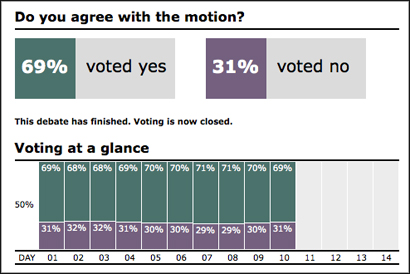Whistle-blowing website WikiLeaks has been online and publishing leaked documents and data since July 2007. Prior to this week, I wouldn’t have hesitated in initially referring to it as “whistle-blowing website WikiLeaks” and getting in a definition of what the site does and how it works.
 Writing this afternoon though, that bit of exposition feels a lot less necessary. Last Sunday’s coordinated publication of the Afghanistan war logs by WikiLeaks, the Guardian, the New York Times and Der Spiegel has catapulted the small, independent organisation – and it’s director Julian Assange – into an entirely new realm of public notoriety.
Writing this afternoon though, that bit of exposition feels a lot less necessary. Last Sunday’s coordinated publication of the Afghanistan war logs by WikiLeaks, the Guardian, the New York Times and Der Spiegel has catapulted the small, independent organisation – and it’s director Julian Assange – into an entirely new realm of public notoriety.
This post is a round-up of some of the media industry’s responses to the biggest leak in US military history.
On Monday the story took up the first 14 pages of the Guardian, 17 pages of Der Spiegel, and numerous lead stories in the New York Times.
Too much, too soon, writes Slate’s media commentator Jack Shafer.
By inundating readers with Assange’s trove, the three news organization broke one of the sacred rules of journalism: If you have a big story—especially one based on a leak like this one—drip, drip, drip it out to your audience rather than showering them with it. The reader can absorb drips better than torrents.
Ultimately, more time, and care, was needed, says Shafer: “There was too much material for the newspapers and magazines to swallow on such a short deadline.”
His assessment echoes that of BBC College of Journalism director Kevin Marsh, who reports on Assange’s press conference at the Frontline Club on Monday.
[W]hat was danced around (…) was how much the three news organisations were able to verify and test the documents – and, crucially, their exact provenance – to which WikiLeaks gave them access. In the way they would if they were dealing direct with their own assessable sources.
How much did they know about the source or sources of the document pile? His/her/their motivation? Track record? What was not there and why not? What was incomplete about what was there?
This matters. A lot. Especially if WikiLeaks is to become – or has already become – a kind of stateless brokerage for whistleblowing.
NYU’s Jay Rosen also picks up on the ‘no-fixed abode’ quality of WikiLeaks, calling it the “world’s first stateless news organisation”:
If you go to the WikiLeaks Twitter profile, next to “location” it says: Everywhere. Which is one of the most striking things about it: the world’s first stateless news organization. I can’t think of any prior examples of that (…) WikiLeaks is organized so that if the crackdown comes in one country, the servers can be switched on in another. This is meant to put it beyond the reach of any government or legal system.
According to Assange, WikiLeaks, which is sort-of based in Sweden due to the country’s extremely progressive freedom of information laws, does “not have national security concerns” and is “not a national organisation.” He frequently claims the site’s loyalty is to truth and transparency. Writing for the Telegraph, Will Heaven (whose piece may smack ever so slightly of sour grapes), questions the idea that the organisation has no political agenda.
WikiLeaks is a website with no political agenda, its founder Julian Assange would have you believe. So I’m puzzled by today’s “Afghanistan war log” story. It doesn’t strike me – or many of my colleagues – as politically neutral to feed such sensitive information to three Left-leaning newspapers: namely the Guardian, the New York Times, and Der Spiegel. Even more puzzling that WikiLeaks would choose, very deliberately, to contravene its own mission statement – that crowdsourcing and open data are paramount.
It was Nick Davies of the Guardian with whom the possibility of this kind of publication was first discussed by Assange. The Guardian team threw everything but the kitchen sink at their run on the material, with all the interactive and data know-how we have come to expect of them. prostate masage near me Editorially, they focused on bringing to light the abhorrent disregard for the lives of civilians detailed in parts of the logs but largely covered up by the military.
The logs detail, in sometimes harrowing vignettes, the toll on civilians exacted by coalition forces: events termed “blue on white” in military jargon. The logs reveal 144 such incidents (…)
Accountability is not just something you do when you are caught. It should be part of the way the US and Nato do business in Afghanistan every time they kill or harm civilians. The reports, many of which the Guardian is publishing in full online, present an unvarnished and often compelling account of the reality of modern war.
Media commentator Jeff Jarvis asked Guardian editor Alan Rusbridger if he thought the newspaper should have started WikiLeaks itself, to which Rusbridger responded that he felt it worked better separately. Jarvis claims that the joint publication effort showed that the future of journalism lay in “adding value”:
If you don’t add value, then you’re not needed. And that’s not necessarily bad. When you don’t add value and someone else can perform the task as stenographer or leaker or reporter — and you can link to it — then that means you save resources and money. This means journalists need to look at where they add maximum value.
There were plenty of journalists in attendance when Assange appeared at the Frontline Club again on Tuesday night, this time for an extended discussion with both press and just the plain curious.
“We are not an organisation for protecting troops,” he told the audience. “We are an organisation for protecting human beings.”
To that end, WikiLeaks held back 15,000 of the 92,000 documents contained in the archive because, the organisation claimed, they had the potential to put the lives of civilians and military informers in Afghanistan at risk.
But on Wednesday morning the Times alleged that:
In just two hours of searching the WikiLeaks archive, the Times found the names of dozens of Afghans credited with providing detailed intelligence to US forces. Their villages are given for identification and also, in many cases, their fathers’ names. US officers recorded detailed logs of the information fed to them by named local informants, particularly tribal elders.
The backlash against WikiLeaks and its director gathered steam on Thursday when New York Times editor Bill Keller strongly criticised the organisation in an email to the Daily Beast for making so much of the material available without properly vetting it.
In our own publication, in print and on our website, we were careful to remove anything that could put lives at risk. We could not be sure that the trove posted on WikiLeaks, even with some 15,000 documents held back, would not endanger lives. And, in fact, as we will be reporting in tomorrow’s paper, our subsequent search of the material posted on WikiLeaks found many names of Afghan informants who could now be targets of reprisals by the insurgents (…)
Assange released the information to three mainstream news organizations because we had the wherewithal to mine the data for news and analysis, and because we have a large audience that would take this seriously. I think the public interest was served by that. His decision to release the data to everyone, however, had potential consequences that I think anyone, regardless of how he views the war, would find regrettable.
WikiLeaks has acted grossly irresponsibly in the eyes of some press organisations, but it has been lauded by others as a pioneer for both its commitment to increasing transparency – and in doing so encouraging reform – and for its approach to publicising the logs and trying to achieve the maximum amount of impact for material that people have risked a great deal to expose. From the Editorsweblog:
Getting media outlets involved early was a way to make sure that there was comprehensive coverage of the information. WikiLeaks is not trying to be a news outlet, it wants to get the information out there, but does not intend to provide the kind of analysis that a newspaper might. As Nick Davies told CJR, agreeing to release the information simultaneously let each of the three newspapers know that they had an almost exclusive story in which it was worth investing time and effort. And as Poynter noted, its exclusivity caused competitors to scramble and try to bring something new out of the story.
Whichever side of the fence you fall on, it is difficult to deny that the method of the leak marks a significant change in the organisation’s relationship with the news media and in the role the industry has to play in events of this kind.

